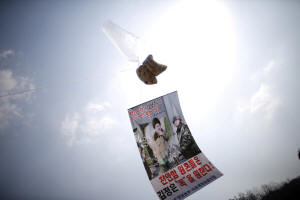|
Defectors and other campaigners in South Korea have for decades
sent anti-North Korean leaflets over the tightly guarded border,
usually by balloon or in bottles on border rivers. They also
send food, medicine, money, mini radios and USB sticks
containing South Korean news and dramas.
Isolated North Korea has long denounced the practice and
recently stepped up its condemnation of it, to the alarm of a
South Korean government intent on improving ties on the divided
peninsula.
The South Korean parliament voted on Monday to amend the
Development of Inter-Korean Relations Act to bar any scattering
of printed materials, goods, money and other items of value
across the heavily fortified frontier.
It also restricts loudspeaker propaganda broadcasts, which the
South's military once championed as part of psychological
warfare against the North until it withdrew the equipment
following a 2018 summit between the two Koreas.
The ban will take effect in three months and violators face up
to three years in prison or 30 million won ($27,400) in fines.
The change was approved despite efforts by opposition lawmakers
to block the super-majority of the ruling party of President
Moon Jae-in, who is keen to improve cross-border ties.
CONSTITUTIONAL CHALLENGE
The bill was introduced in June after Kim Yo Jong, the sister of
North Korean leader Kim Jong Un, said South Korea should ban the
leaflets or face the "worst phase" of relations.
"They're trying to put Kim Yo Jong's order into law at her
single word," Tae Yong-ho, an opposition lawmaker and former
North Korean diplomat, said in a 10-hour filibuster speech,
adding the bill would only help Kim's government continue
"enslaving" its people.
Park Sang-hak, a defector who has already been stripped of a
license for his leaflet-launching group and faces a prosecution
investigation, said he would not give up his 15-year campaign.
"I'll keep sending leaflets to tell the truth because North
Koreans have the right to know," he told Reuters. "I'm not
afraid of being jailed".
Park and some other 20 rights groups in South Korea vowed to
challenge the law's constitutionality, while Human Rights Watch
called the ban a "misguided strategy" by South Korea to win
Kim's favour.
"It criminalises sending remittances to families in North Korea
and denies their rights to outside information," said Shin
Hee-seok of the Transitional Justice Working Group.
"Such appeasement efforts only risk inviting further North
Korean provocations and demands."
Chris Smith, a U.S. Republican congressman co-chairing a
bipartisan human rights commission, issued a statement
criticising the amendment as "ill-conceived, frightening" for
facilitating the imprisonment of people for simply sharing
information.
When asked about Smith's statement, South Korean's Unification
Ministry, which handles ties with North Korea, said the bill was
a "minimal effort to protect the lives and safety of residents
in border regions".
(Reporting by Hyonhee Shin; Additional reporting by Daewoung
Kim; Editing by Alex Richardson, Robert Birsel)
[© 2020 Thomson Reuters. All rights
reserved.] Copyright 2020 Reuters. All rights reserved. This material may not be published,
broadcast, rewritten or redistributed.
Thompson Reuters is solely responsible for this content.

|
|






